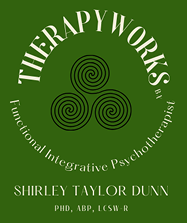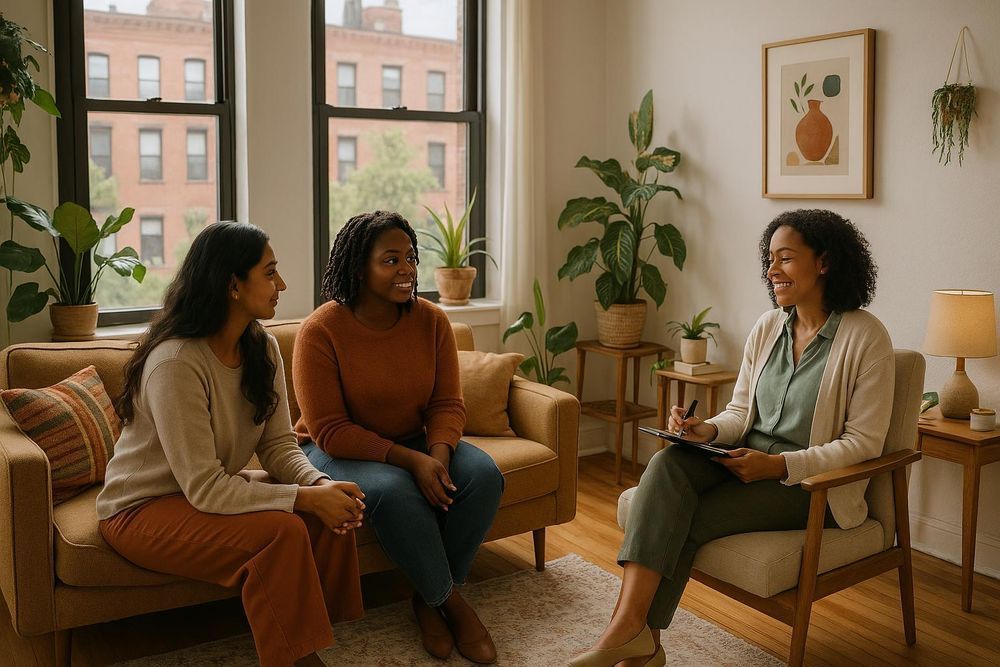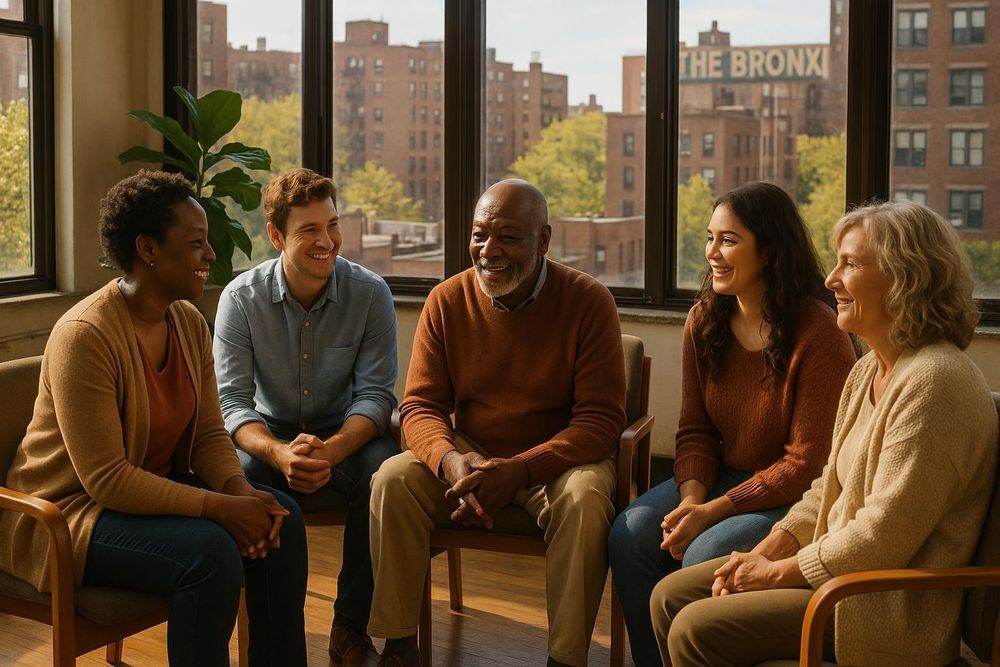How Culturally Responsive Family Therapy Supports Stronger Bonds in New York
Understanding the Power of Culturally Responsive Family Therapy in New York
When you think about your family’s well-being, you likely recognize the importance of strong communication, emotional support, and understanding—especially in a city as diverse as New York. Family therapy offers a proven path toward improving these bonds, but for many families, it’s essential that therapy goes beyond generic approaches. Culturally responsive family care acknowledges your unique experiences, values, and traditions, ensuring that every member of your family feels seen and heard. In a multicultural environment, this type of family psychotherapy can be the difference between simply addressing issues and truly fostering lasting, meaningful change.
Why Culturally Responsive Family Care Matters
Every family brings its own history, cultural background, and set of expectations to the table. In New York, where families often blend traditions from across the globe, these cultural nuances can shape how you communicate, resolve conflict, and express love or concern. Culturally responsive family care recognizes the importance of these factors, adapting therapeutic techniques to honor your family’s values and beliefs.
When you engage in family therapy that prioritizes cultural understanding, you’re not just addressing surface-level issues. Instead, you’re working with a professional who appreciates the complexities of your cultural identity and how it influences family dynamics. This approach leads to more effective family psychotherapy, as it centers your lived experiences and helps you build healthier patterns rooted in respect and empathy.
Family Communication Improvement: The Heart of Stronger Bonds
Effective communication is often at the core of family therapy. However, what constitutes “good” communication can vary widely depending on your cultural background. In some families, open emotional expression is encouraged, while in others, subtle gestures or indirect language may be the norm. Culturally responsive family therapy recognizes these differences and helps you bridge any gaps in understanding.
By working with a therapist who is attuned to your cultural context, you gain practical strategies for family communication improvement. This might include:
- Identifying and respecting different communication styles within your family
- Learning to express emotions and needs in ways that feel authentic and safe
- Addressing generational differences in language or values
- Reducing misunderstandings that arise from cultural or linguistic nuances
These skills lay the foundation for deeper connection and trust, allowing you to resolve conflicts constructively and support one another’s mental health.
Cultural Understanding in Family Therapy: Building Empathy and Respect
Family therapy mental health support is most effective when it recognizes the importance of cultural understanding. In New York, families often face external pressures related to identity, discrimination, or acculturation stress. These challenges can strain relationships and impact your family’s emotional well-being. A culturally responsive therapist helps you navigate these issues with sensitivity and insight.
Through open dialogue and guided reflection, you’re encouraged to share your individual perspectives and experiences. This process fosters greater empathy among family members and helps you appreciate the unique strengths each person brings to the family unit. By validating your cultural heritage and addressing the impact of societal pressures, family psychotherapy becomes a powerful tool for building resilience and mutual respect.
Family Psychotherapy in New York: Meeting the Needs of Diverse Households
New York families are as varied as the neighborhoods they live in. Whether you’re part of a multigenerational household, a blended family, or navigating the challenges of raising adolescents, family therapy in New York can provide the support you need. Culturally responsive family care ensures that your therapist understands the realities you face, from balancing traditional values with modern expectations to coping with the stressors of urban life.
Family psychotherapy sessions are designed to address a wide range of concerns, including:
- Intergenerational conflicts or misunderstandings
- Parenting challenges in multicultural settings
- Adjustment to major life changes, such as immigration or relocation
- Mental health therapy for families dealing with anxiety, depression, or trauma
By focusing on both individual and collective needs, your therapist helps you create actionable goals that strengthen your family’s emotional bonds and overall well-being.
Mental Health Therapy for Families: Creating a Safe Space for Healing
Seeking family therapy mental health support is a courageous step toward healing. For many families, especially those from historically marginalized communities, it’s crucial that therapy feels like a safe, non-judgmental environment. Culturally responsive family care places safety and trust at the forefront, ensuring that you and your loved ones can share openly without fear of misunderstanding or stigma.
Your therapist will work with you to identify both the challenges you face and the strengths you possess. By acknowledging cultural influences on mental health and family dynamics, you’re empowered to break cycles of silence and create new patterns of support. Whether you’re addressing long-standing issues or simply seeking to improve your family’s communication, mental health therapy for families provides the tools you need to move forward together.
Family Therapy New York: Accessible Support for Every Family
Access to effective family therapy in New York has never been more important. With the city’s fast-paced lifestyle and ever-changing social landscape, families benefit from having a dedicated space to reflect, reconnect, and grow. Culturally responsive family care ensures that therapy is accessible, relevant, and deeply meaningful for families from all walks of life.
When you choose a therapist who specializes in cultural understanding in family therapy, you’re investing in your family’s future. You gain the guidance and support needed to navigate life’s challenges while honoring your unique identity. Whether you’re seeking family psychotherapy for conflict resolution, communication improvement, or overall mental health, you’ll find that culturally responsive care makes all the difference in building stronger, more resilient bonds.
How Family Therapy Addresses Everyday Challenges in Diverse New York Households
Living in a vibrant city like New York means your family may face unique challenges—balancing cultural traditions with modern expectations, navigating generational differences, and managing the stressors of urban life. Family therapy provides a supportive environment where you can address these everyday hurdles with the guidance of a professional who understands the nuances of culturally responsive family care.
In family psychotherapy sessions, you are encouraged to bring forward real-life situations. Whether you are struggling with misunderstandings between parents and teenagers, adjusting to life after a major move, or coping with the impact of external stressors such as discrimination or economic hardship, your therapist works alongside you to identify patterns and develop practical solutions. This process not only supports your family’s mental health but also helps you build the resilience needed to thrive in the city’s fast-paced environment.
Building Bridges: Family Communication Improvement Strategies
One of the most common reasons families seek therapy is to improve communication. In New York, where families often consist of members from different cultural backgrounds, communication styles can sometimes clash. Culturally responsive family care recognizes these differences and helps you find common ground.
- Active Listening: You’ll learn to listen to each other without judgment, allowing every voice to be heard and respected.
- Clarifying Intentions: Your therapist will help you explore the meaning behind words and actions, reducing the risk of misinterpretation that may arise from cultural or generational gaps.
- Nonverbal Communication: By understanding the role of body language, tone, and silence, you can become more attuned to one another’s needs.
- Conflict Resolution Skills:
You’ll practice resolving disagreements in ways that honor your family’s values, whether that means direct discussion or more subtle approaches.
These strategies are woven into family psychotherapy sessions, empowering you to create new habits that support healthier relationships at home.
Cultural Understanding in Family Therapy: Honoring Traditions and Identity
Your family’s cultural heritage is a source of strength and pride. However, it can also be a source of tension if members hold differing views on traditions, roles, or expectations. Family therapy mental health professionals in New York are trained to help you navigate these complexities with sensitivity and respect.
During sessions, you may explore:
- How cultural traditions shape your family’s expectations around communication, discipline, and emotional expression
- Ways to integrate new practices while honoring long-held customs
- Approaches for addressing intergenerational conflicts that arise from differing cultural perspectives
- The importance of language, religion, and community in your family’s daily life
By fostering open dialogue about these topics, family psychotherapy creates a safe space for every member to express their identity and feel valued. This process helps you strengthen your family’s bonds while embracing the richness of your shared and individual experiences.
Supporting Mental Health Through Family Therapy in New York
Mental health therapy for families goes beyond addressing behavioral issues or conflicts—it’s about supporting the emotional well-being of each member and the family as a whole. In a city as dynamic as New York, stress can come from many sources: work, school, financial pressures, or societal expectations. Culturally responsive family care ensures that these stressors are addressed within the context of your family’s lived reality.
Your therapist will work with you to identify signs of stress, anxiety, or depression that may be impacting your relationships. By understanding how cultural beliefs influence attitudes toward mental health, you can break through stigma and create an environment where it’s safe to seek support. Family therapy New York services often include education about mental health, coping skills, and resources for ongoing care, so you have the tools you need to support one another through life’s ups and downs.
The Benefits of Family Psychotherapy for Multigenerational and Blended Families
Many New York families are multigenerational or blended, bringing together diverse backgrounds, experiences, and expectations. Family psychotherapy is uniquely suited to support these households, helping you navigate the complexities that come with different ages, roles, and cultural influences.
- Bridging Generational Gaps: Therapy provides a platform for understanding how each generation views the world, allowing you to appreciate differences and find common values.
- Managing Role Transitions: Whether you are welcoming a new family member, adjusting to changing caregiving responsibilities, or redefining parental roles, your therapist helps you adapt with empathy and cooperation.
- Strengthening Stepfamily Bonds: Blended families benefit from strategies that promote trust, understanding, and shared experiences, reducing feelings of isolation or conflict.
Through culturally responsive family care, you can honor the unique contributions of each member while building a cohesive, supportive family unit.
Addressing Stigma and Encouraging Openness in Mental Health Therapy for Families
Despite growing awareness, mental health stigma persists in many communities. This can make it difficult for families to seek help or speak openly about their struggles. Family therapy in New York acknowledges these barriers and works to create a welcoming, judgment-free space for healing.
Your therapist will help you address concerns about confidentiality, cultural beliefs around mental health, and fears about being misunderstood. By normalizing the process of seeking support, you can encourage each family member to share their feelings and experiences honestly. This openness is essential for effective family psychotherapy and for building a culture of mutual support and understanding within your home.
Family Therapy New York: Making Support Accessible and Flexible
One of the strengths of family therapy in New York is its accessibility and adaptability. Recognizing the busy schedules and diverse needs of families across the city, therapists offer flexible options, including evening and weekend appointments or virtual sessions. This ensures that you can prioritize your family’s mental health without sacrificing other commitments.
Additionally, culturally responsive family care means your therapist is committed to providing services that are affordable and considerate of your family’s unique circumstances. Whether you are seeking short-term support for a specific challenge or ongoing guidance for long-term growth, you’ll find that family psychotherapy is designed to meet you where you are.
How to Prepare for Your First Family Psychotherapy Session
Taking the first step toward family therapy can feel daunting, especially if you have never participated in counseling before. Preparing for your initial session can help ease nerves and set the stage for a positive experience.
- Discuss Expectations: Talk with your family members about what you hope to achieve and any concerns you may have.
- Gather Relevant Information: Consider sharing important family history, cultural traditions, or recent events that may be impacting your relationships.
- Keep an Open Mind: Remember that therapy is a collaborative process, and every member’s voice matters.
- Ask Questions: Don’t hesitate to ask your therapist about their experience with culturally responsive family care or their approach to family psychotherapy.
By approaching therapy with curiosity and openness, you increase the likelihood of meaningful progress and positive change.
What to Expect During Ongoing Family Therapy Sessions
As you continue with family psychotherapy, you’ll notice that sessions are tailored to your evolving needs. Your therapist will guide conversations, introduce exercises, and offer feedback designed to help you achieve your goals. You might participate in activities that foster empathy, practice communication skills, or work through specific challenges as a group.
Throughout the process, culturally responsive family care remains central. Your therapist will regularly check in about cultural considerations, ensuring that your family’s values and traditions are always respected. This commitment to understanding your unique perspective helps you build trust, deepen connections, and foster lasting growth.
Choosing the Right Family Therapy Mental Health Professional in New York
Finding a therapist who understands your family’s background and needs is crucial for a successful experience. When searching for family therapy New York services, consider the following:
- Cultural Competence: Look for a therapist with experience in culturally responsive family care and a demonstrated commitment to ongoing learning.
- Approach and Philosophy: Ask about their methods for family communication improvement and how they incorporate cultural understanding into sessions.
- Accessibility: Ensure the therapist offers flexible scheduling and a convenient location or telehealth options.
- Credentials and Experience: Review their qualifications, areas of expertise, and feedback from other families with similar backgrounds.
Taking the time to find the right fit can make all the difference in your family’s therapeutic journey.
Resources and Community Support Beyond Family Therapy
In addition to family psychotherapy, many New York families benefit from connecting with community resources. Support groups, cultural organizations, and educational workshops can provide additional tools and a sense of belonging. Your therapist can help you identify relevant resources that complement your family therapy mental health journey, strengthening your support network and enhancing your overall well-being.
Embracing Growth and Change Through Culturally Responsive Family Care
Family therapy is not just about resolving conflicts—it’s about fostering growth, resilience, and understanding within your household. By embracing culturally responsive family care, you give your family the opportunity to honor your heritage, improve communication, and support each other through life’s challenges. The journey may involve difficult conversations, but with the guidance of a compassionate professional, you can build stronger bonds and a healthier, more harmonious home.
Integrating Culturally Responsive Family Therapy into Daily Life
When you participate in family therapy that honors cultural understanding, you’re not just resolving conflicts during sessions—you’re building habits and practices that can be woven into your family’s everyday life. Culturally responsive family care encourages you to celebrate your heritage, recognize the strengths within your family unit, and approach challenges with empathy and flexibility.
By applying strategies learned in family psychotherapy, you can create rituals that reinforce connection, such as shared meals, storytelling, or community involvement. These activities can help bridge generational gaps, foster mutual respect, and deepen the sense of belonging among all members. As you continue to practice open communication and emotional support at home, you’ll notice a positive shift in how your family navigates both daily routines and significant life events.
Family Therapy Mental Health Approaches for Modern Families
In a diverse city like New York, modern families face unique pressures—balancing work and school, adapting to shifting roles, and staying connected in a fast-paced world. Mental health therapy for families provides practical approaches to address these realities. Through family therapy, you can learn to prioritize self-care, set healthy boundaries, and maintain open lines of communication, even when schedules are hectic.
Therapists specializing in family therapy mental health understand how cultural expectations and external stressors, such as discrimination or economic hardship, can impact your well-being. They offer guidance on managing these challenges, providing coping skills and resources that reflect your family’s specific needs. Whether your family is navigating a transition or simply seeking greater harmony, these approaches ensure you have the tools and support to thrive together.
Choosing Family Psychotherapy That Honors Your Values
Finding a family psychotherapy provider who respects your cultural values is essential for building trust and achieving meaningful progress. In New York, you have access to therapists who prioritize cultural understanding in family therapy and who are committed to continuous learning about diverse traditions and experiences.
When selecting a provider, consider asking about their experience with families similar to yours, their approach to culturally responsive family care, and how they incorporate your traditions and beliefs into therapy. This proactive approach ensures that your family feels respected and empowered throughout your journey. The right therapist will collaborate with you to set goals, celebrate milestones, and support each member’s growth, always within the context of your unique cultural background.
Family Communication Improvement Beyond the Therapy Room
While therapy sessions offer structured opportunities for growth, the most significant changes often happen in your everyday interactions. Family communication improvement is a continuous process that extends beyond the therapy room. By practicing skills such as active listening, emotional validation, and conflict resolution at home, you reinforce the progress made during sessions.
- Encourage regular family check-ins to discuss feelings, challenges, and successes.
- Establish family rituals—like weekly meetings or shared activities—that foster connection.
- Use culturally meaningful practices, such as storytelling or shared traditions, to deepen understanding.
- Create a safe space where every member feels comfortable expressing themselves.
These habits can transform your family’s communication patterns, making it easier to navigate disagreements and celebrate achievements together.
Supporting Children and Adolescents Through Family Therapy
Children and adolescents often experience unique challenges as they navigate identity, peer relationships, and academic pressures. Family therapy New York services are designed to include younger members, ensuring their voices are heard and their experiences validated. Culturally responsive family care pays special attention to the intersection of cultural identity and developmental needs.
Therapists use age-appropriate strategies to help children and teens express their feelings, build confidence, and develop coping skills. By involving the whole family, you create a supportive environment that helps young people manage stress, build resilience, and maintain strong connections to their roots. This holistic approach is especially valuable in multicultural households, where children may be balancing multiple cultural identities.
Addressing Intergenerational and Cultural Gaps in Family Therapy
Intergenerational differences are a common source of tension in many families, particularly in households where cultural traditions are evolving. Family psychotherapy offers a space to explore these differences openly, fostering empathy between parents, grandparents, and children. Through guided conversations, you can identify shared values, negotiate new traditions, and find ways to honor both the past and the present.
Therapists skilled in cultural understanding in family therapy help you navigate sensitive topics such as language preferences, religious practices, and expectations around independence or family roles. By bridging these gaps, you strengthen your family’s unity and create a foundation for ongoing growth and adaptation.
Enhancing Family Resilience and Well-Being
Resilience is the ability to adapt and thrive in the face of adversity. Family therapy mental health support is a powerful resource for building resilience, especially when it incorporates culturally responsive family care. By recognizing the strengths within your family and drawing on cultural traditions, you can weather life’s challenges with greater confidence.
Therapists often encourage families to identify and celebrate their successes, no matter how small. This focus on positive reinforcement helps shift the narrative from one of struggle to one of empowerment. As you build resilience together, you’ll find it easier to support each other through transitions, setbacks, and new opportunities.
How Family Therapy New York Services Adapt to Your Needs
One of the hallmarks of family therapy New York services is flexibility. Therapists understand that each family’s schedule, needs, and preferences are unique. Many offer evening and weekend appointments, as well as virtual sessions, to ensure you can access support when it works best for you. This adaptability makes it easier to prioritize your family’s mental health without disrupting your daily routines.
In addition, culturally responsive family care means your therapist will continually adapt their approach based on your feedback and evolving circumstances. Whether you’re facing a short-term crisis or seeking long-term support, you’ll find that therapy can be customized to fit your goals and lifestyle.
Connecting with Community Resources for Ongoing Support
Beyond individual sessions, many families benefit from connecting with community resources that reinforce the principles of family therapy. Support groups, cultural organizations, and local workshops can provide additional guidance and a sense of belonging. Your therapist can help you identify resources that align with your family’s interests and needs, extending the impact of therapy into your broader community.
Participating in these activities not only enhances your family’s well-being but also helps you build a supportive network. This network can offer encouragement, practical advice, and new perspectives, all of which contribute to your family’s continued growth and resilience.
How Therapy Works BX Supports Families in New York
When you’re ready to invest in your family’s well-being, it’s important to work with a provider who truly understands your experiences. Therapy Works BX specializes in culturally responsive family care, offering family psychotherapy and mental health therapy for families throughout the Bronx, Manhattan, Brooklyn, Queens, and greater New York. You’ll find therapists who are not only highly trained but also deeply committed to honoring your family’s cultural background and unique strengths.
At Therapy Works BX, you have access to affordable, flexible therapy options designed to fit your schedule and budget. The team is dedicated to providing a safe, welcoming environment where every member of your family feels valued. With expertise in family communication improvement, cultural understanding in family therapy, and a holistic approach to mental health, you receive the support you need to build stronger, healthier bonds.
If you’re seeking family therapy in New York that recognizes your family’s identity, traditions, and goals, reach out to Therapy Works BX. For more information or to schedule a consultation, connect directly with Shirley Taylor Dunn at
taylordunnshirley@gmail.com. Experience the difference that culturally responsive family care can make for you and your loved ones.



